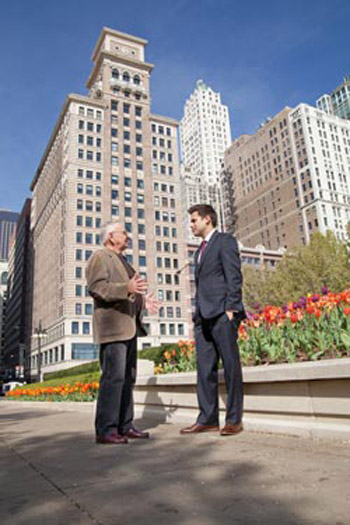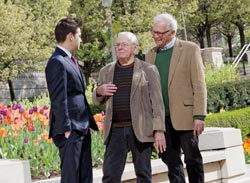
Photo: Michael Goss
Two generations of gay rights activists join to discuss the evolution of the movement.
“He was beaten so badly that his mother couldn’t recognize him.”
With a voice that is quiet yet strong in expression, Chicago activist James Darby (M.Des. ’69) describes one element of a pivotal event that ignited the country’s gay rights movement and his own passionate cause for equality for gay veterans.
“He” was Allen R. Schindler Jr., a 22-year-old sailor from Chicago Heights, Ill., who was stomped and pummeled to death on October 27, 1992, in Sasebo, Japan, while on shore leave from his duty aboard the USS Belleau Wood. According to an article in the New York Times Magazine, a pathologist who examined Shindler’s body said it was the most severe trauma he had ever witnessed.
Shipmate Airman Apprentice Terry Helvey admitted during questioning that he had a hatred of homosexuals and was sentenced to life in a military prison for Schindler’s murder. Miriam Ben-Shalom, who founded the Gay, Lesbian, and Bisexual Veterans of America (now American Veterans for Equal Rights [AVER]) in 1990 and helped Schindler’s mother retain an attorney in the case, reached out to James Darby to open a GLBVA Chicago Chapter. Darby had supported Ben-Shalom’s GLBVA efforts and told her she had done the right thing in her own fight against discrimination in the military. She took her case to be allowed to serve in the United States Army, even as a lesbian, all the way to the U.S. Supreme Court.
“Schindler’s murder was a bombshell for the gay veterans movement and the Don’t Ask, Don’t Tell policy, both happening at the same time,” says Darby, who retired in 1992 after a 30-year Chicago Public Schools career. The civil rights of gays and lesbians, most notably their open service in the military, was a political issue during the candidacy of President Bill Clinton, who in 1993 implemented the Don’t Ask, Don’t Tell (DADT) policy, which ended last September. “Those moments in history were when everything coalesced together and went off like a rocket,” he says.

Photo: Michael Goss
William Lopez (LAW ’11)—a fast-talking, energetic, magna cum laude graduate—joining Darby and his partner of 48 years, Patrick Bova, for the first time, recalls the “fire was lit” on his own gay rights activism when he heard a presentation at IIT Chicago-Kent College of Law on DADT by Lambda Legal, the nation’s oldest and largest legal organization working for the civil rights of gays, lesbians, and people with HIV/AIDS.
Lopez says the presentation made him realize how much discrimination was occurring in the LGBTQ (lesbian, gay, bisexual, transgender, and questioning) community, and he ran after the presenter, asking how he could get involved. Lopez was awarded a summer internship with Lambda Legal.
“Every day Lambda Legal was doing something to impact legal change in the community,” says Lopez. “Being part of all that for three months showed me that it was exactly what I want to do.”
Lopez was later named president of Chicago-Kent’s Lambdas and organized the college’s first LGBT Civil Rights Conference. He has since been hired as the first openly gay associate at Hinshaw & Culbertson LLP.
Openly gay since the age of 16, Lopez had supportive friends, and parents who became more supportive as time went on. As a University of Miami undergraduate, he began to see that homosexuality was another diversity “checkmark” that he could bring to the table, whether applying for schools or jobs. He listened in astonishment as Darby recalled the first time he was invited to a Chicago gay bar in the 1950s.
“We had two drinks and suddenly, all of the lights went on and police ran in the front door; it was a raid. I ran out the back door with everybody else right up a ramp leading into a paddy wagon,” says Darby. “I was thrown into a cell with a guy from the Air Force. The judge said, ‘What is this country coming to? You’re in the Navy and you’re in the Air Force, and both in a place like that!”
Darby had kept his homosexuality a secret during his four years as a United States Navy communications technician and Russian translator and felt fortunate that he was able to receive all of his post-military benefits, such as the G.I. Bill. Recipient of a National Defense Service Medal and the Naval Occupation Service Medal, he thought it unfair that so many veterans—even those who had served for 20 years—had lost their benefits because it was revealed that they were gay.
Since founding the Chicago GLBVA, Darby has held offices with the organization at both the local and national levels, including president. He has lobbied in Washington, D.C., for LGBTQ rights and continues to serve as editor of AVER’s The Forward Observer newsletter. Additionally, he has served as secretary of the Mayor’s Advisory Council on Veterans Affairs since 1995. Because of Darby, LGBTQ veterans are saluted each year at Daley Plaza, feted at a Veterans Day dinner, and walk in Chicago’s Memorial Day Parade. Bova notes, however, that civil rights issues related to gays in the military remain.
“One of the chief roadblocks is the Defense of Marriage Act, where benefits guaranteed to married couples recognized by DOMA are not guaranteed in civil unions,” he says. “We are in a civil union in Illinois and that means we have state rights in Illinois. Jim, as a veteran, is eligible for a full military burial in the Abraham Lincoln Cemetery in Illinois, akin to Arlington National Cemetery. Any veteran or veteran’s spouse can be buried there with a full military funeral, but I’m not eligible as his spouse because of DOMA.”
Bova says that while psychological wounds can still run deep within the gay veteran population, discouraging many members from becoming volunteers in the equality cause, new support groups such as OutServe are helping. He and Darby continue to crisscross the country, rallying veteran support from coast-to-coast.
“Jim Darby’s name should be known to anyone interested in the history of LGBTQ people in the United States because he has helped to make that history,” says Ben-Shalom. “His work to keep Allen Schindler’s name remembered is an example of his passion for justice.”
Lopez continues to channel his activism into board membership on both Equality Illinois and the Lesbian and Gay Bar Association of Chicago. In 2011, Windy City Times honored him as one of its “Thirty Under 30” for his contributions to Chicago’s LGBTQ community.
Lopez says that he owes his opportunities today to trailblazers such as Darby and Bova.
“On a daily basis, we’re not going into bars and getting arrested anymore,” he says. “A lot of that is because of people like you who fought the good fight and put their personal and professional lives on the line to make my being a gay attorney a very positive and acceptable thing to be.”
More Online
American Veterans for Equal Rights: aver.us/
Lesbian and Gay Bar Association of Chicago: lagbac.org
“What the Navy Taught Allen Schindler’s Mother”: nytimes.com/1993/09/12/magazine/what-the-navy-taught-allen-schindler-s-mother.html?pagewanted=all&src=pm